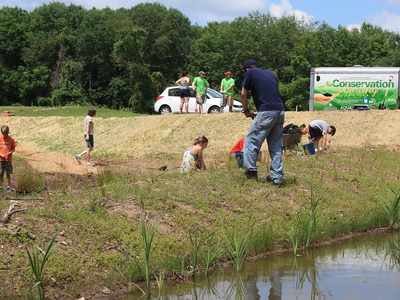What do we mean by Conservation?
 When we talk about ‘conserving’ something, we usually mean to stop it from running out. If a person talks about ‘conserving their energy’ they mean that they are trying not to use it all up quickly.
When we talk about ‘conserving’ something, we usually mean to stop it from running out. If a person talks about ‘conserving their energy’ they mean that they are trying not to use it all up quickly.
It’s the same when we talk about conserving other resources, such as fuels or minerals. Conserving these involves making sure that they are not used wastefully, so that they are prevented from being used up altogether.
Conservation of natural habitats or species of wildlife refers to maintaining healthy ecosystems and population numbers so that no plants or animals become endangered or extinct. There are lots of different methods that are used to do this, which you can learn more about in the following sections of this factsheet.
Photo: Montgomery County Planning Commission
Read More: Why is Conservation important for the Environment?